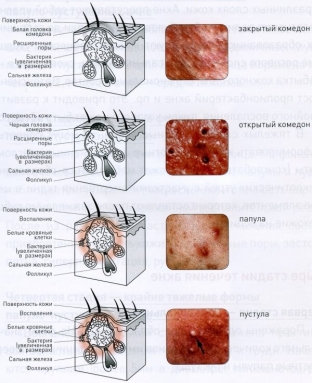Acne vulgaris is an actual problem of modern dermatology, most often they disturb young people. Acne vulgaris spoils the appearance, forming many complexes in their owner. Attempts to treat acne vulgaris began from the very beginning of mankind's acquaintance with this pathological process. It is known that the most effective treatment of any disease, including the treatment of acne vulgaris, depends on the correct choice of etiological and pathogenetic approaches. What is the pathogenesis of acne development? Methods of pathogenetic and etiological treatment of acne vulgaris read further on estet-portal.com.
The main links in the pathogenesis of acne
There are several links in the pathogenesis of acne. This is hereditary hyperandrogenism, which leads to an increase in the number of sebaceous glands that produce a large amount of sebum. This is follicular hyperkeratosis, which leads to the development of closed or open comedones. And this is the reproduction of facultative anaerobes, which provoke the destruction of the wall of the sebaceous glands, after which its contents enter the dermis. Against this background, inflammation is formed.
Followed by clinical changes in the form of a pseudopolymorphic rash, which has a clear staging. So, first comedones appear, then papules, pustules, nodes, when they fester, cysts form, the destruction of which is accompanied by the formation of foci of depigmentation and scars. The effectiveness of the treatment of acne vulgaris depends on the stage of the pathological process.
There are 4 stages of acne:
- 1 – comedones (closed and open) and up to 10 papules;
- 2 – comedones, papules and up to 5 pustules;
- 3 - comedones, papular – pustular rash, up to 5 knots;
- 4 – pronounced inflammatory reaction in the deep layers of the dermis with the formation of painful nodes and cysts.

Aspects of the treatment of acne vulgaris in the early stages
Today, both systemic and local preparations are used to treat acne vulgaris. The choice of treatment for acne vulgaris depends on the stage of the process and the severity of the clinical course. For the treatment of acne of the 1st degree, it is enough to carry out comprehensive skin care with the help of medical cosmetics, notes estet-portal.com. Cosmetics should combine both a regressive effect on acne elements and skin care. It is necessary to cleanse the skin of the face with products with kerato – and sebum-regulating action, as well as with anti-inflammatory effect.
The fact of the negative impact of insolation on the course of acne vulgaris – solar radiation induces cell apoptosis.
Treatment of acne vulgaris at the pathogenetic stage of hyperandrogenism, that is, at the initial stage, should be carried out by means that affect the severity of androgenization (hormonal drugs, spironolactone).
What is the effective treatment for acne vulgaris in stages 2-4?
For 2 – In the 4th stage of acne, the treatment of acne vulgaris consists, in addition to skin care, in the appointment of antibacterial drugs of systemic and local action. The most effective antibacterial drugs – tetracycline, doxycycline, erythromycin and clindamycin. Sulfanilamide preparations are prescribed much less frequently.
The introduction of retinoids for topical and systemic use into the treatment of acne vulgaris, which have shown effectiveness in the treatment of stage 1-3 acne, is considered revolutionary.
 Despite the availability of a wide range of drugs for the treatment of acne vulgaris, their use does not always lead to long-term remission after cessation of therapy. As practice shows, to date, the most effective drug for the treatment of acne vulgaris is the oral form of isotretionine. This form can be used both as monotherapy and in combination with other substances in the severe course of the process.
Despite the availability of a wide range of drugs for the treatment of acne vulgaris, their use does not always lead to long-term remission after cessation of therapy. As practice shows, to date, the most effective drug for the treatment of acne vulgaris is the oral form of isotretionine. This form can be used both as monotherapy and in combination with other substances in the severe course of the process.
Mechanism of action of isotretionine:
- acting on sebocyte receptors, reduces the production of sebum;
- eliminates hyperkeratosis of the mouth of the duct sebaceous gland and prevents the formation of comedones;
- reduce colonization of hair follicle;
- has an anti-inflammatory effect on the skin.
Thus, the treatment of acne vulgaris depends on the stage and severity of the process. The use of antibacterial drugs is always indicated in the treatment of acne. Effective in the treatment of acne vulgaris are preparations of isotretionine.







Add a comment